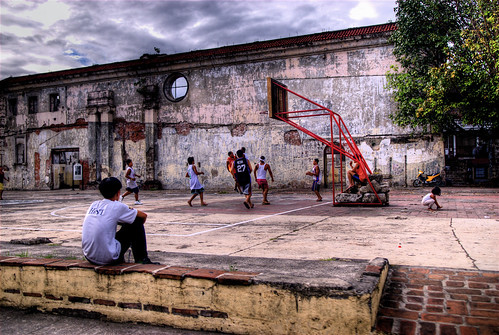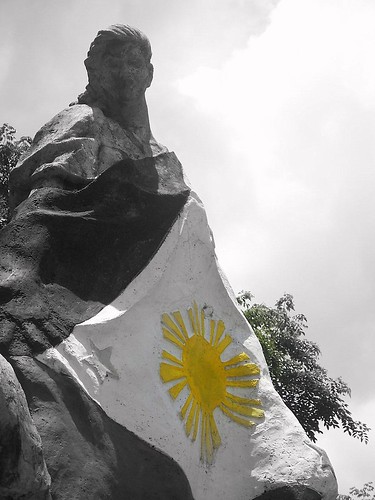
photo: regelzamora, Creative Commons, Flickr


 Photo: bingbing, Creative Commons, Flickr
Photo: bingbing, Creative Commons, Flickr

 Q: Lessor X leased out his house to Lessee Y on a monthly basis. A few months later, X gave a written notice to Y to vacate the premises since the latter was not paying his rent.
Q: Lessor X leased out his house to Lessee Y on a monthly basis. A few months later, X gave a written notice to Y to vacate the premises since the latter was not paying his rent.

 Barack Obama becomes the first black candidate to run for President after a drawn out battle against Hillary Clinton for the Democratic Party's nomination. Click here for the complete story.
Barack Obama becomes the first black candidate to run for President after a drawn out battle against Hillary Clinton for the Democratic Party's nomination. Click here for the complete story.General practice to cross-border practice: Trends & paradigms
Justice Dante O. Tinga
Good afternoon. Right off, I thank Justice Jose Sabio for a memorable yet straightforward introduction, shorn of the usual hyperbole.
I also thank the Ateneo Law School, for according me the privilege to address this year’s graduating class. I refuse to believe though that the privilege has something to do with my being the chair of the 2008 Bar Examination Committee. This graduating class particularly does not need "bar tips."
I congratulate the graduates, the Ateneo Law community, and the wider community of the family and friends of the 2008 graduates of the Ateneo School of Law. Without their love and support of the graduates, this day would not have been a reality. The travails of law school are especially unique, perhaps even barely comprehensible to the outsider. The untypically intense classroom; the daunting attrition rate; the inimitable pressure inflicted by reading voluminous textbooks, cases and materials, not to mention the unique writing style of a Chief Justice during the martial law years. It is difficult to translate these peculiar stresses to family and friends who are not lawyers or who had no experience in law school, yet all that suffices from them is unwavering trust and unquestioning support.
And to the members of the Ateneo law faculty, kudos to you for having finely honed a fresh batch of graduates in the proud tradition and values of the Ateneo Law School. The Ateneo legal education has more than adequately prepared the graduates not only to pass the final hurdle to law practice, the bar examinations, but more so to ply the legal profession. Its curriculum aptly looks beyond the immediacy of passing the examinations, focusing as it does on the consequential objective to mold intellectually proficient, morally upright, and properly oriented members of the Bar and citizens of the Republic.
I have found it hard choosing an appropriate topic for this occasion. That difficulty is peculiar to sitting members of the Supreme Court. While there are multitudes of fascinating legal topics worthy of discourse, the field of choice of incumbent justices is limited. They cannot speak on a question which is sub judice or which expectedly may be brought before the Court. In a way though, this difficulty flowing from the nature of our office bears an advantage. We cannot be compelled to speak on certain things, a form of "executive privilege," if you will.
As I was mulling over the choice of subject for my speech, I asked myself what may have motivated you, the graduates, to take up law just as I tried to recall how and why I entered law school myself. Was it because you really wanted to become a lawyer and practice law as well? Or was it just a delaying tactic? You didn’t know what you wanted to do. Or, you saw law as a means to an end? You wanted to become rich as you suspected lawyers make a lot of money. You wanted to get into politics having learned that many politicians are also lawyers. Or you wanted to go into business and preferred to be the one who would fool others, instead of being fooled. Or, you didn’t know what course else to take? Or you abhorred math? Or was it because there was no lawyer in the family yet?
In the end, I decided to devote my address today to the evolving legal practice in the Philippines, and to the challenges and benefits of such an evolution. To begin, we must accept the premise, shattering as it may be to our complacency, that our law practice is evolving, and will continue to evolve to respond to the needs of the times.
To backtrack a bit, I was admitted to the Philippine Bar during the presidency of Carlos P. Garcia, whose well-meaning "Filipino First" economic policy had the unfortunate effect of unduly favoring local cartels. Attuned perhaps to those protectionist times, the legal practice in the Philippines then was more insular. By tradition, most lawyers were immersed in general practice, and specialization was almost unheard of. We handled civil and criminal cases, land and family law cases, tax and simple patent cases – in short, the sort of cases which the public perceives to be the bread and butter of the legal profession. In a sense, the limited scope of legal practice then was reflective of the times. Our economy was less complicated and our society more parochial then than they are today. Our especially close military and political ties with the United States then, and the greater polarization of the Cold War world between communist and noncommunist nations, allowed the Philippines to bother less with the intricacies of the dynamics of globalization, which was then a pipe dream.
Subsequently, martial law and the dictatorship happened. No amount of revisionism can becloud the darkness of those times. Anybody who consciously exercised their guaranteed civil and political rights lived in reasonable fear that they could be abducted or even killed at the hands of the government that was supposed to protect them. Only Marcos-approved sentiments or messages could be expressed in the mass media. If the Internet existed then, it would have been restricted and censored, and bloggers would have lived in fear of arrest or worse.
Yet from the unholy cauldron of martial law, a new breed of lawyers emerged – the human rights lawyers, for whom totalitarian oppression proved to be their formative experience. There emerged a field of law that focused on the promotion of an individual’s civil and political rights, especially in behalf of those disadvantaged by circumstance or the will of others from fully comprehending the innate existence of such rights. The heroic human rights lawyers would later exert an especially strong influence on the post-EDSA socio-political discourse, such as in the crafting of the 1987 Constitution.
The post-EDSA years gave rise to an even more complex legal playing field, corresponding to the growing complexity of our own laws. The considerable economic boom the Philippines experienced during the 1990s had a profound effect on legal practice. Many law firms chose to embrace specialization over general practice, and the biggest of the firms created specialized departments or areas of practice. The height of economic success proved especially beneficial to firms specializing in corporate law, while the following economic downturn would favor firms specializing in civil litigation and collection cases.
Legislative developments also led to new fields of specialization in law. Earlier, the enactment of the Labor Code changed the dynamics of labor law from being a mere subset of civil and contract law into a specialized field that attracted many lawyers. Concerns over the ecosystem found expression in the 1987 Constitution, in jurisprudence and in legislation, from which environmental law emerged as another field of specialization in the Philippines. New technologies have given rise to added fields of legal practice -- witness the recent growth of telecommunications law and e-commerce law. Existing laws, such as the Tax Code and the Securities Regulation Code, became more sophisticated, leading to a greater necessity for specialized practice in those fields. And there have been recent laws that deal with uncharted waters, such as the Mining Act and the Indigenous People Rights Act that have created entirely new legal paradigms which may very well lead to a need for specialization in those areas as well.
There is a common thread to all these evolutionary developments. It is when these movements and trends enter the national public-consciousness that Philippine legal practice needed to adapt to accommodate these new developments. Many times, it was not enough to accommodate these emergent circumstances into the existing legal milieu; instead it is our own legal system that was forced to adjust to the times. And noticeably, many of these issues were thrust into the national public debate by figures or movements which may have initially been outside of the establishment or the mainstream thought, but whose ideas gained acceptance over time.
I now would like to bring focus to one trend that has emerged internationally which our own legal system has yet to accommodate. The rise of the globalized economy has led to the growing acceptance by many states of cross-border practice of law by foreign lawyers. Cross-border practice has been allowed within the European Union since the late 1970s as a consequence of the adoption of a common market. It has been regulated through Directives, which established guidelines governing the provision of services, the mutual recognition of diplomas, and the establishment of permanent professional law practices in foreign states. The allowance of the cross-border practice of law in the European Union has not led to any major problems or scandals, despite initial fears that there would be an unacceptable increase in unregulated or uncontrollable behavior, fears which have proved unfounded.
The accession by the Philippines to the General Agreement on Trade in Services (GATS) as part of the Uruguay Round Agreement might very well be the gateway to the allowance of cross-border practice of law in the Philippines. The GATS, which was intended towards "the early achievement of progressively higher levels of liberalization of trade in services," defines "services" as any service in any sector except services supplied in the exercise of governmental authority," the latter exception being defined as "any service which is supplied neither on a commercial basis, nor in competition with one or more service suppliers."
This definition of "services" clearly includes the provision of professional legal services. The GATS mandates that "each Member shall accord immediately and unconditionally to services and service suppliers of any other Member treatment no less favourable than that it accords to like services and service suppliers of any other country." However, it is also recognized that such treatment may not be possible for every service activity, thus the parties are authorized to specify exemptions, which are included as an annex to the GATS, and subject to review after five years and a normal limitation of 10 years in their duration. The GATS also provides guidelines for allowing the automatic and mutual recognition of education and experience obtained, requirements met, or licences or certifications granted, in a particular country.
In a recent workshop conducted by the ASEAN Law Association, there was a consensus that the liberalization of the legal services sector in ASEAN countries was desirable and inevitable because of the GATS, notwithstanding resistance among many ASEAN nations based on the view that the right to practice in the local Bar is an adjunct of sovereignty. The International Bar Association has likewise adopted a resolution calling for the "Regulation of Foreign Lawyers" as practitioners of foreign law for the limited purpose of permitting them to practice the law of their home jurisdiction in the host jurisdiction without examination or full admission to the host bar.
There are, as should be expected, potential problem areas with respect to cross-border practice. An especially sensitive topic is the applicable code of conduct that applies to a lawyer engaged in cross-border practice. Since most nations have adopted their own legal codes of conduct, the question arises whether such codes bind the foreign lawyer practicing in that country, or whether the foreign lawyer remains bound to her or his own national code. The European Union has mandated that such lawyer be subject to both home and host rules, a situation which has come to be known as "double deontology." Perhaps, as cross-border practice becomes more prevalent worldwide, the need will arise for the adoption of international agreements governing the code of conduct of lawyers in cross-border practice.
Section 14, Article XII of our Constitution states that "[t]he practice of all professions in the Philippines shall be limited to Filipino citizens, save in cases prescribed by law." Nonetheless, since the GATS is part of the WTO Agreement, a treaty which the Philippines ratified in 1994, it has the force of law in this jurisdiction. In any event, any legislation allowing foreigners to practice their profession in the Philippines, following Section 14, Article XII, will pass constitutional muster, except the professions which the Constitution specifically confines to Filipino citizens, such as the management of mass media or the advertising industry.
There are understandable qualms within the Philippine legal community, especially among the old-guard, to the allowance of cross-border practice in the Philippines. Some of these concerns may arise out of self-interest, such as the potential diminution in profits of Filipino lawyers, but others do arise out of selfless, nationalistic motives. It is not an accessible assumption that foreign lawyers will act in the best interests of their Filipino clients, or adhere to the interests of Filipino sovereignty as they develop their particular advocacies. Neither could we intelligently assume that foreign lawyers will be well-versed in the Philippine legal system, or the Philippine social animus, to be able to render the most competent legal services to Filipino or Philippine-based clients. Indeed, even if cross-border practice were eventually allowed in the Philippines, a prospective client of a foreign lawyer would still be best served by an element of caution, or a minimal degree of caveat emptor.
Nonetheless, if we refuse to allow cross-border practice of law in the Philippines even as the rest of our Asian neighbors accede to the practice, the Philippines will be in danger of isolation from the global community. And truth be told, there are benefits to allowing cross-border practice here which extend beyond signification that we are members in good standing of the international trade community. Just as the Supreme Court has extremely benefited with its interactions with foreign high courts and foreign legal systems, the Philippine legal community can only be intellectually enriched with greater exposure to the legal practices of foreign lawyers. These interactions may even spur necessary law reforms in the Philippines. Added competition could likewise provide the impetus for the improvement or further competence of Filipino lawyers, who may have settled into professional complacency.
As a matter of fact, increasingly many of the best and brightest of our young lawyers have benefited from cross-border practice as they gained employment in foreign law firms in as diverse jurisdictions as Singapore and Norway. I can predict with certainty that within five years, some of you of the graduating class of 2008 will be practicing your profession in a different country. This development should not be cause for alarm, for we cannot really fault a Filipino desirous of self-improvement securing the most advantageous economic situation for her or his family. At the same time, if our own domestic law practice were to be diversified to allow cross-border practice, the result may very well be a more dynamic and profitable local milieu that provides more enticing opportunities for advancement.
The emergence of cross-border practice, not only as potentially adopted by the Philippines, but also as currently engaged in by Filipino lawyers abroad, may necessitate adjustments as well in the curriculum of Philippine law schools. The ASEAN Law Association, in its 2003 General Assembly, identified the need to train lawyers who are commercially relevant in an era where cross-border transactions are increasingly the norm; to sensitize law students to the larger issues of globalization such as human rights and the environment; and to revise law school curricula to include greater emphasis on international and comparative laws.
A legal curriculum that is designed solely to gain the law student’s eventual admission to the Philippine bar through rote memorization of Philippine legal provisions will be woefully insufficient to train such student in this fast evolving legal environment. A more viable curriculum is one designed to help the law student absorb the fundamentals that permeate all the legal systems of the world. A student who is grounded in these basics, as well as in legal methodology, will be better equipped in interacting with the international legal community and the transnational business circles, as well as in grasping the inevitable changes in Philippine law.
For example, in corporation law, I submit that it is more useful to train the student in the fundamental principles of corporate practice and securities regulation, as well as trade and finance, as they are applied in the world, rather than focus on mastery of the individual provisions of our Corporation Code. There is no harm, of course, in studying the provisions of the Corporation Code, yet the ultimate goal should be to use these provisions to unlock the philosophy which underlies their adoption, and how such philosophy relates to the theories that gave rise to the fundamentals in corporate law.
And if the Philippine legal scene were reoriented with an eye towards accommodating the international community, even the law schools such as that of the Ateneo would stand to benefit. There are all the good reasons, and there should be no impediments for a future wherein the most promising students in the Asia-Pacific region, if not the world, would aspire and compete for admission to the Ateneo School of Law. That prospect would become more immediate the moment cross-border practice is permitted in the Philippines. Still, when that time comes, it will most likely not spur a sudden need or rush for foreigners to devote their careers to the practice of law in the Philippines. That time will only emerge if Philippine law schools such as the Ateneo are able to provide a legal education that supplies universal legal skills that find application regardless of the legal system or jurisdiction.
Yes, we should not fear, but try to embrace, the continuing modernization of law even if it leads to directions that our own law school education might not have prepared us for. At the same time, we must always remember that the law exists not merely to facilitate the complex activities of mankind, but to ensure that these activities are conducted in good faith and with due respect for the rights of others. As we bear witness to the evolution of law, we must observe fealty to the ethical values of the profession, remain grounded with our basic humanity and democratic ideals, and resist changes which seek to countermand the moral obligations of law.
You, the graduates of the Class of 2008, face the prospect of uncertain boundaries in the field of law. Inevitably, the face of law practice in the Philippines will be markedly different from what you have been exposed to in law school or what you will learn in your initial years of practice. I myself have been witness to these changes, and I can only take delight in such evolution as a sign of progress. I hope you take it upon yourselves to further your legal education. A life in the law offers a dynamically evolving curriculum that advances with the progress and successes achieved by the human race in furthering the eminent values of liberty, equality, freedom, prosperity and justice.
Clearly, through the years, law practice has undergone a grand transformation, characterized by phenomenal leaps and bounds. Filipino lawyers themselves have been assigned changing monickers. First, there was the provincial lawyer – the laidback type; then the city lawyer – the slick type; next the abogado de campanilla – the lawyer’s lawyer; and very soon, the Filipino lawyer will be known as the international lawyer or the transnational practitioner.
So, to the graduates of the Class of 2008, welcome to the emerging new world of law. Welcome to the new paradigms of legal practice. Thank you and good day to all.
 Some bad news for heavy marijuana smokers: it seems smoking weed daily for 20 years can lead to paranoia, social withdrawal and memory loss. Click here for the whole story.
Some bad news for heavy marijuana smokers: it seems smoking weed daily for 20 years can lead to paranoia, social withdrawal and memory loss. Click here for the whole story.